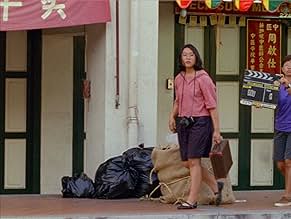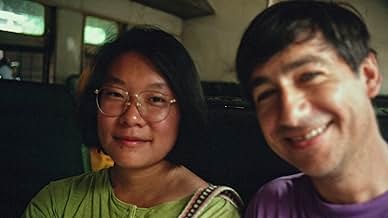IMDb RATING
7.3/10
5.9K
YOUR RATING
A woman explores the events surrounding a film she and her friends began making with a mysterious stranger decades ago.A woman explores the events surrounding a film she and her friends began making with a mysterious stranger decades ago.A woman explores the events surrounding a film she and her friends began making with a mysterious stranger decades ago.
- Awards
- 8 wins & 31 nominations total
Jasmine Kin Kia Ng
- Self
- (as Jasmine Ng)
Georges Cardona
- Self
- (archive footage)
- (uncredited)
- Director
- Writer
- All cast & crew
- Production, box office & more at IMDbPro
Featured reviews
Unfortunately whilst this film was well crafted and it is nice to see Singapore on screen, it was clearly the product of someone capable and desperate to put a film together but without a story of any interest to tell. This tale was hardly something that needed to be told to the world and is actually completely unremarkable. However in the 'documentary' these grown adults are talking about it (the lost film Shirker and the story behind it) as if it is a thing of legend.
The main character, playing herself Sandi Tan, comes across as extremely unlikable and arrogant / deluded and the rest of the cast don't come across much better possibly with the exception of Jasmine who seems tired but resigned to her old friend's behaviour. The only aspect of the story that was at all compelling was that of Georges, the strange and mysterious man befriending children with unclear intentions, however this storyline also ultimately disappointed.
Difficult to reconcile the film I watched with the 'award winning' film described.
The main character, playing herself Sandi Tan, comes across as extremely unlikable and arrogant / deluded and the rest of the cast don't come across much better possibly with the exception of Jasmine who seems tired but resigned to her old friend's behaviour. The only aspect of the story that was at all compelling was that of Georges, the strange and mysterious man befriending children with unclear intentions, however this storyline also ultimately disappointed.
Difficult to reconcile the film I watched with the 'award winning' film described.
Works on a lot of levels - as a glimpse into indie/counterculture in Singapore in 1992 with a distinctive young woman's voice, as an exploration into the psychological abuser who absconded with her film (what an asshole this guy was!), and as a study in reconnecting with friends decades later, taking them all back to a special time and place, and then viewing themselves from a distance. It's outrageous and maddening, but at the same time, touching and lovely. Very well done by Sandi Tan, and I would love to see a dubbed version of the original film.
This documentary came highly recommended from sources I trust and is either praised to the rafters or leaves the viewer completely indifferent. I can understand why people clicked with this movie; I'm not confused why they enjoyed it but the euphoric reviews baffle me. For my part I found it sappy and trivial.
The documentary follows a woman, talking 20 years on, trying to piece together a lost film from her childhood in Singapore. The result is it's terribly self-important for someone who made two short films. Great documentaries, no matter how intimate or grand the subject, convince the viewer they're talking about something important. This element is missing. The film they were making didn't even look promising. To me it's no less vain and uninteresting to watch your average student filmmaker wax lyrical about their creative process but somehow this has more importance ascribed to it because... it's an older person saying it? There are great examples of documentaries about personal drama, about relationships, about the making of movies, yet this one lacked the punch and relevance of -any- of those.
The documentary also mentions Werner Herzog's film Fitzcarraldo - that film spawning the sweeping making-of documentary Burden of Dreams. Unintentionally this only serves to remind me of a filmmaker who actually did something noteworthy with their craft.
I will say as a documentary itself, it has a pleasing aesthetic and I can find no real technical faults. This is perhaps owing to the original film's film stock that nowadays evokes nostalgia in its viewers. This film also benefited from its audience seeking it out; it mainly attracted people who would enjoy this and I thought I'd be in that group. I'd be interested to see how a larger audience would react to this.
Ultimately it's the life story about someone who's not that interesting to listen to; a tale of a friendship that's not endearing; a making-of of a movie that didn't look good to begin with. Although what happened is terrible and unjust, it must unfortunately be admitted that the film world was at no great loss without that film and probably wouldn't be without this one.
The documentary follows a woman, talking 20 years on, trying to piece together a lost film from her childhood in Singapore. The result is it's terribly self-important for someone who made two short films. Great documentaries, no matter how intimate or grand the subject, convince the viewer they're talking about something important. This element is missing. The film they were making didn't even look promising. To me it's no less vain and uninteresting to watch your average student filmmaker wax lyrical about their creative process but somehow this has more importance ascribed to it because... it's an older person saying it? There are great examples of documentaries about personal drama, about relationships, about the making of movies, yet this one lacked the punch and relevance of -any- of those.
The documentary also mentions Werner Herzog's film Fitzcarraldo - that film spawning the sweeping making-of documentary Burden of Dreams. Unintentionally this only serves to remind me of a filmmaker who actually did something noteworthy with their craft.
I will say as a documentary itself, it has a pleasing aesthetic and I can find no real technical faults. This is perhaps owing to the original film's film stock that nowadays evokes nostalgia in its viewers. This film also benefited from its audience seeking it out; it mainly attracted people who would enjoy this and I thought I'd be in that group. I'd be interested to see how a larger audience would react to this.
Ultimately it's the life story about someone who's not that interesting to listen to; a tale of a friendship that's not endearing; a making-of of a movie that didn't look good to begin with. Although what happened is terrible and unjust, it must unfortunately be admitted that the film world was at no great loss without that film and probably wouldn't be without this one.
"Henceforth, audience's curiosity is sizably whetted, and Tan's ensuing quest of "who is Georges Cardona" spirits us away to Cardona's hometown, interviewing his acquaintances and ex-wife (whose image is gingerly pixelated and only referred as "the widow"), and discloses a vague picture what a man he was, Nosferatu is the ostensible consensus: a fabulist who is envious of the achievement of his protégés, which he is not above to undermine at his convenience. Georges makes for such a fascinating case of mental complexity, the first impression he makes on others: emitting congeniality that incongruent with the cold glint in his eyes, might be the best encapsulation, however, SHIRKERS seem to pull punches in burrowing deeper into the truth (a half measure in our post-truth paranoia), whether it is from Tan's own equivocal interrelation with Georges, or the widow's conspicuous "I don't know anything about it" disclaimer."
A director explores the myth of Singapore's independent cinema: Shirkers, a film made by her and her friends, with the help of a mysterious man.
The atmosphere of this documentary is very interesting, mixing drama with the mood of a serial killer tv show.
It's a well-structured portrait of a young woman dreams, the ambition to change the concept of cinema, in a country with strong censorship and restrictions, as was Singapore in the 90s, and how someone with a perverse and vicious mind can ruin a so beloved project, and traumatize everyone involved.
Some critics and general public think it's pretentious, I disagree with that opinion, it's not intended to increase the protagonist/director's (Sandi Tan) ego, but rather to show how a group of creative minds can be manipulated when they are not yet mature enough to realize how real life works.
The atmosphere of this documentary is very interesting, mixing drama with the mood of a serial killer tv show.
It's a well-structured portrait of a young woman dreams, the ambition to change the concept of cinema, in a country with strong censorship and restrictions, as was Singapore in the 90s, and how someone with a perverse and vicious mind can ruin a so beloved project, and traumatize everyone involved.
Some critics and general public think it's pretentious, I disagree with that opinion, it's not intended to increase the protagonist/director's (Sandi Tan) ego, but rather to show how a group of creative minds can be manipulated when they are not yet mature enough to realize how real life works.
Did you know
- TriviaIn 2018, Sandi Tan premiered her film at the Sundance Film Festival and earned the World Cinema Documentary Directing Award. She was the second Singapore-born filmmaker to win. (The first went to another Tan: Kirsten Tan, for Pop Aye, the previous year.)
- ConnectionsFeatures La blonde et moi (1956)
- How long is Shirkers?Powered by Alexa
Details
- Release date
- Countries of origin
- Official site
- Language
- Also known as
- Shirkers: Bộ Phim Bị Đánh Cắp
- Production companies
- See more company credits at IMDbPro
- Runtime
- 1h 37m(97 min)
- Color
- Aspect ratio
- 1.78 : 1
Contribute to this page
Suggest an edit or add missing content






















